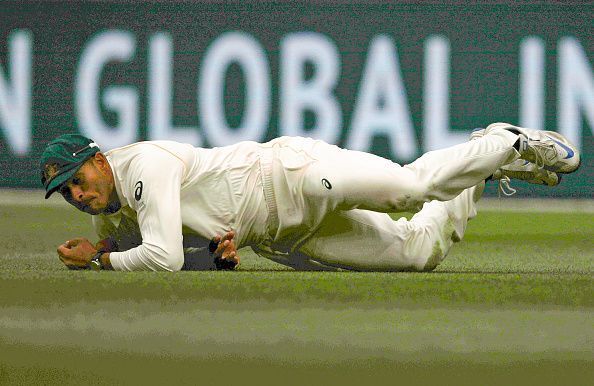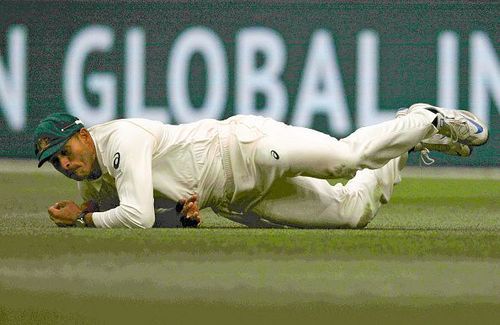
Was Stuart Broad out at the MCG?

Drama surrounded the dismissal of Stuart Broad in England's first innings in Melbourne when a debatable catch by Usman Khawaja at third man sparked an argument. With Pat Cummins pitching it short outside off, Broad sliced at it and the ball found the top edge.
Khawaja sprinted forward with the ball dying towards him, trying to bag it using both hands. But the ball seemed to have popped out, thus forcing the question if it touched the grass as he attempted grabbing it with his left hand.
Both his hands were hidden underneath his falling body, also obscuring the ball in the process. When he got up on his feet, the ball was found stuck safely in his left hand. By the word of the fielder himself, he was unsure if it had properly carried into his hands.
While it was contemplated if the invisible ball was pouched while Khawaja fell, umpire Kumar Dharmasena had a word with his on-field colleague Sundaram Ravi and then decided on the soft signal – out – even when Khawaja indicated his own doubts.
That meant third umpire Joel Wilson required substantial conclusive evidence to turn around the decision. After numerous replays from multiple angles, with one of them suggesting the ball to have spliced out, Wilson took his time before finally having to arrive at the verdict and agree with Dharmasena.
Some further replays clearly showed the ball was certainly not so properly visible as to be given a fair decision – Dharmasena's word would then have had to be believed, considering it was the on-field call – as one replay was convincing enough to help overturn his decision.
Yet again, with all the technology at his disposal, the third umpire was unable to find genuine proof when it came to such catches. In cases like these, it is then that the half-sure on-field umpire's verdict is given priority despite the obvious debate of the fielder not being confident yet the umpire giving it out from more than fifty metres away.
The ICC can perhaps consider eliminating the rule of the soft signal, reasoning the fact that the benefit of the doubt would always go to the on-field umpire, irrespective of his decision, especially when the TV umpire would not be able to locate the ball's exact location in spite of repeated replays. It can be left solely to the third umpire in concluding whether or not he thought there was adequate video evidence of arriving at such controversial decisions.
But in Khawaja's case, with doubts in his own mind and Dharmasena signalling out, third umpire Wilson could help little in reversing the former's decision.